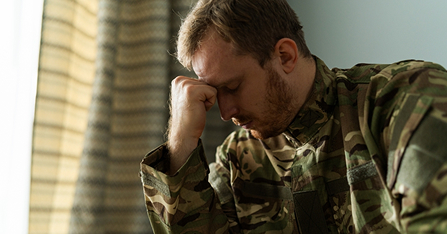As a veteran, you likely encountered stressful or traumatic situations that have a lasting impact on you. Veterans who have endured trauma may believe that no one could understand their experience or wonder where they can turn for support and compassion. While phobia VA disability benefits are available to relieve some of the burden, navigating the process of applying for and securing these benefits is an uphill battle.
At VetLaw, we fight to make sure you receive the benefits you deserve. Whether you are working to increase your phobia disorder VA rating or appealing an unfairly denied claim, we are here to help. Schedule your free case review to get started today.

Contact Us Today
We Will Fight For Your Benefits
We guarantee 100% privacy. Your information will not be shared.
What Are the Specific Phobias the VA Considers to Be a Disability?
A phobia is a persistent and uncontrollable fear of a specific object, activity, or situation. The fear could be so overwhelming that a person will go to great lengths to avoid the source of anxiety. Some phobias are very specific and can be easily avoided in day-to-day life. Other phobias cause challenges in a wider range of situations, forcing the person to alter their lives drastically. In severe cases, a specific phobia can impact a person’s ability to work, maintain relationships, and perform routine activities.
Some of the most common specific phobias that the VA considers to be a disability include the fear of:
- Enclosed spaces (claustrophobia)
- Outdoors, crowds, and open spaces (agoraphobia)
- Social interaction (social phobia or social anxiety)
- Flying (aerophobia)
- Being alone (autophobia)
- Driving (amaxophobia)
With the exception of agoraphobia and social anxiety, specific phobias are not explicitly named in the VA’s rating schedule. Rather, each disability claim will be assessed on a case-by-case basis.
What Are the Common Signs and Symptoms of Specific Phobias?
The signs and symptoms of specific phobias can feel different for everyone and vary in severity from person to person. Specific phobias may cause a person to experience physical, behavioral, and/or mental symptoms when they are exposed to the source of fear. Some of the most common signs and symptoms of specific phobias that veterans report experiencing include:
- Panic attacks
- Chest pain
- Headache
- Depersonalization and derealization
- Dizziness
- Tinnitus
- Trembling
- Numbness or tingling
If you experience any of these symptoms as a result of your military service, you may qualify for phobia VA disability benefits. Your attorney can help guide you through the eligibility requirements to determine if benefits are available for you and your family.

How Does Military Experience Influence Specific Phobias?
Members of the armed forces regularly face stressors and traumatic events that civilians rarely encounter in their lives. Military experience undoubtedly influences the development of specific phobias. Prolonged time away from loved ones, experiencing traumatic events and injuries, natural disasters, and combat incidents are all common causes of specific phobias among military personnel and veterans.
While it is true that not all stressors result in a mental health disorder, the chances of developing fear, anxiety, and depression increase when a veteran is exposed to trauma. Moreover, repeated and continuous exposure to traumatic events can further exacerbate the issue. If you are struggling with a specific phobia connected to your military experience, you are not alone.
What Is the VA Rating for Phobias?
Phobias are rated under the VA Schedule of Ratings for Mental Disorders. Various codes are used to determine a veteran’s phobia disorder VA rating, including Diagnostic Code 9403 for specific phobias and social anxiety, Diagnostic Code 9412 for agoraphobia and panic disorders, and Diagnostic Code 9413 for unspecified anxiety disorders. The VA will consider the severity of your symptoms and the level of social and occupational impairment, then assign a rating based on the following criteria:
- 0% if a specific phobia has been diagnosed but does not manifest in symptoms that interfere with social and occupational function or require continuous medication.
- 10% if you experience transient or mild symptoms that only decrease work efficiency in periods of high stress, or if symptoms can be controlled by continuous medication.
- 30% if your symptoms occasionally decrease work efficiency or result in an inability to perform occupational tasks.
- 50% if you struggle with symptoms like panic attacks, impaired judgment, or flattened affect that reduce reliability and productivity at work.
- 70% if you experience symptoms like illogical speech, obsessive rituals, or near-continuous panic that affects your work and social relationships.
- 100% if you suffer from total social or occupational impairment due to severe symptoms like hallucinations, grossly inappropriate behaviors, or disorientation.
Do Phobias Often Co-occur with Other Disorders?
Specific phobias have a high level of comorbidity with other disorders, with an estimated 50 to 80% of people with specific phobia also experiencing at least one other mental disorder. Persistent depressive disorder, PTSD, generalized anxiety disorder, and substance abuse are all common disorders that co-occur with specific phobias.
Will the VA Cover a Phobia that Is a Secondary Condition?
A secondary condition occurs as a result of a separate condition that is already service connected. Veterans can pursue benefits for secondary conditions if they can prove that their condition was incurred because of or aggravated by an already service-connected disability.
If your phobia is a secondary condition to another mental health disorder, the VA will use the same rating schedule to determine your total disability rating. If your phobia is secondary to a physical disability like GERD or migraines, then the VA will assign a separate phobia disorder VA rating which will be combined to create your overall disability rating.
How Do You Prove Your Service Connection for a Phobia?
To successfully obtain phobia VA disability benefits and begin collecting compensation, you must first prove service connection. To establish service connection for a phobia, the VA will evaluate all of the evidence provided in your claim. Medical evidence like doctor’s notes, diagnostic reports, and treatment records play a key role in supporting your claim. A strong nexus letter written by a licensed professional can also go a long way when proving service connection.

What If the VA Denies Your Claim for a Phobia?
The process of applying for VA disability benefits can be incredibly complex and time-consuming, with even the smallest missteps often leading to denial. The VA exists to serve veterans. Rather than dwelling on a denial, take action and continue pursuing the benefits you deserve. Contacting a veterans disability appeals attorney can make all the difference at this point. Your attorney will guide you through the process of identifying the right appeal option for your claim, initial the appeals process, and advocate for you during every step of the process.
Hiring an Attorney Near You to Help with Your VA Disability Appeal for Specific Phobia
If you are a veteran who has developed a specific phobia as a result of your military service, you may be entitled to phobia VA disability benefits. As a veteran-owned law firm, we use our military experience and in-depth knowledge of the VA’s intricate rules and regulations to provide effective legal guidance to our clients. Our VA psychological claim attorneys are dedicated to serving our nation’s veterans as they attempt to navigate one of the most stressful processes of their lives. To discuss your case with our team, consider scheduling your free case review today.

